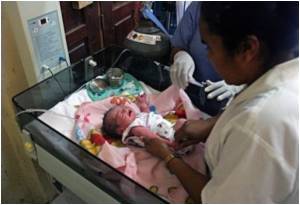The progress on child survival has accelerated sharply since 2000, according to new data released today by UNICEF, the World Health Organization, the World Bank and the UN Population Division.

And progress is accelerating: Between 2000 and 2011, the annual rate of reduction in the global under-five mortality rate jumped to 3.2 per cent, up from 1.8 per cent in 1990-2000. Sub-Saharan Africa, the region with the greatest challenge in child survival, has doubled its rate of reduction, from 1.5 per cent per year in 1990-2010 to 3.1 per cent in 2000-2011. An estimated 19,000 children still died every day in 2011, and around 40 per cent in the first month of life,most from preventable causes. The gains in child survival, although significant, are still insufficient to achieve Millennium Development Goal 4 of reducing the global under-five mortality rate by two-thirds between 1990 and 2015. Only six of the world's 10 regions are on track to reach the target. Proven solutions need to be expanded to accelerate progress on child survival faster and farther.
Committing to Child Survival: A Promise Renewed is a global movement to accelerate action on maternal, newborn and child survival and build on progress since 1990. More than 100 governments have since June renewed their commitment to child survival.
Sub-Saharan Africa and Southern Asia face the greatest challenges in child survival, and currently account for more than 80 per cent of global under-five deaths. Their disparity with other regions is becoming more marked as regions such as Eastern Asia and Northern Africa have cut child deaths by more than two thirds since 1990.
Half of all under-five deaths occurred in five countries: India (24 per cent), Nigeria (11 per cent), Democratic Republic of the Congo (7 per cent), Pakistan (5 per cent) and China (4 per cent). India and Nigeria account for more than a third of all under-five deaths worldwide.
Globally, the leading causes of death among children under five are pneumonia (18 per cent of all under-five deaths), preterm birth complications (14 per cent), diarrhoea (11 per cent), complications during birth (9 per cent) and malaria (7 per cent).
Source-ANI
 MEDINDIA
MEDINDIA


 Email
Email





